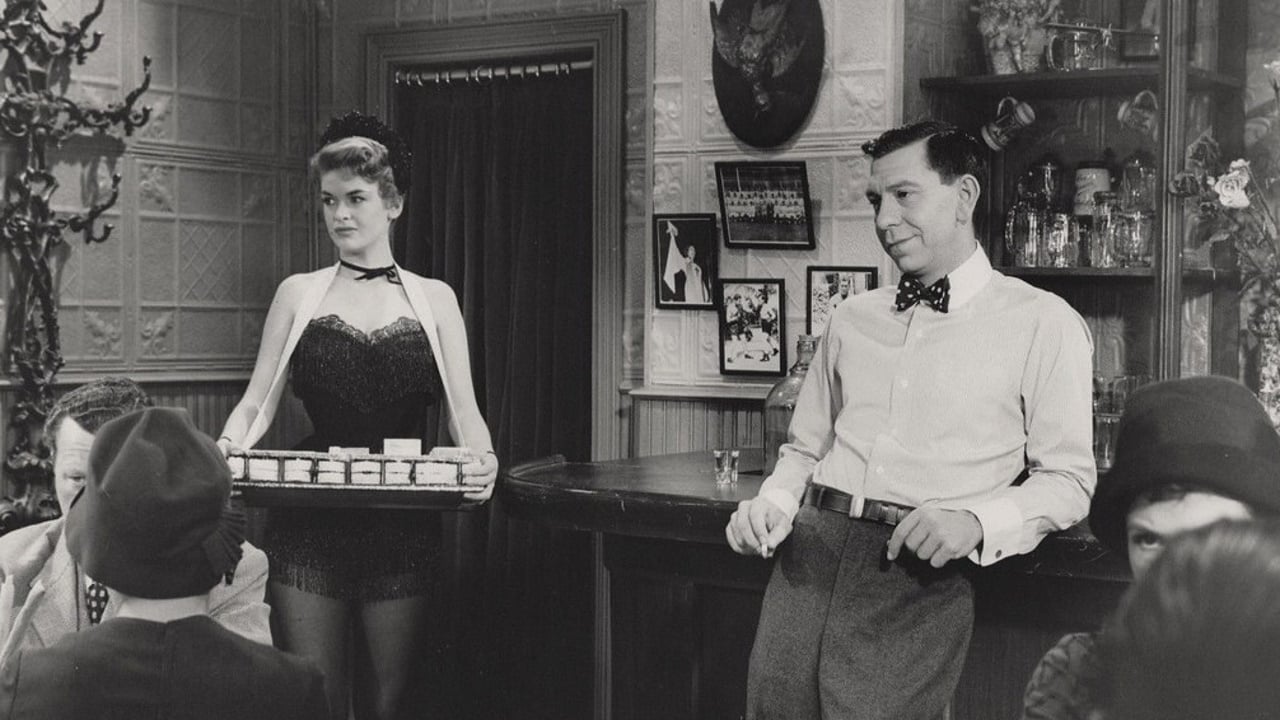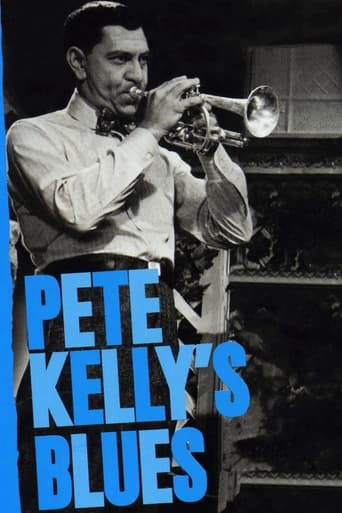

I just watched this on Turner Classic Movies the other night after not having seen it in years, back when it was a pan-and-scan version loaded with commercials.It was great seeing it uncut and commercial-free in it's original letterboxed CinemaScope format. Director Jack Webb shows a creative visual imagination, and along with cameraman Hal Rosson he creates some decent period atmosphere, despite the limits of those early widescreen lenses. This would have been better in the old 3-strip Technicolor format, but that's really splitting hairs.The thing with this picture that never gets it off the ground is Jack Webb, the actor. He's just not believable as a jazzman. Despite Ella Fitzgerald, who is tremendous, and Peggy Lee, somewhat wasted in this role (in more ways than one) Webb is wooden and one-dimensional. Maybe Monty Clift or even Jeffrey Hunter would have been better. James Dean would have made this into a classic, despite the hackneyed storyline of musicians having to pay the mob to keep their gig.That plot point should have been a given, with the musicians doing their gig and paying the mob and playing their music against the backdrop of jazz age 1920's.This movie needed less plot and more atmosphere, and a better leading man. Webb the actor sinks this one.
... View MoreBy 1927, jazzy cornet player Jack Webb (as Pete Kelly) and his seven-piece combo are the house band at a speakeasy in Kansas City, Missouri. All seems well until gangster Edmond O'Brien (as Fran McCarg) demands Mr. Webb hand over 25 percent of the band's earnings in return for his marginal managerial skills. Webb is also required to make Mr. McCarg's attractive girlfriend Peggy Lee (as Rose Hopkins) his instrumental group's lead singer. Webb must pay up or see his band members roughed up and/or gunned down. After some debate, the band is persuaded to play it safe. Then, Webb changes his tune and decides to fight..."Dragnet" radio and TV star Webb directs his cast and crew very well. He does not waste an inch of the "CinemaScope" screen. When space is used, it's for dramatic effect. What this story needed was better exposition and some more time given Mr. O'Brien's character. Strangely, Webb gets fine performances from all except his leading man. He varies his stiff stance by repositioning his hands, but Webb seems to have his mind on directing and his character never really forms. Trying to romance Webb in her scenes, beautiful Janet Leigh (as Ivy Conrad) is fighting a lost cause. There are no sparks flying between the two...Given the juiciest part, as an alcoholic singer, Ms. Lee is excellent; she won Film Daily's annual "Supporting Actress" award. Andy Devine, Lee Marvin and Martin Milner are impressive, in featured roles. Webb used Mr. Milner when he produced "Adam-12" as a younger, hipper "Dragnet" for the 1960s (and 1970s). It's amusing to watch Webb punch any male member of the cast who gets in his way. He repeatedly knocks out Mr. Marvin, a much bigger man, with surprising ease. And, you can't go wrong when Ella Fitzgerald appears as a lounge singer. The music, cast and wide screen visuals made this one worth watching.******* Pete Kelly's Blues (7/27/55) Jack Webb ~ Jack Webb ~ Jack Webb, Janet Leigh, Peggy Lee, Edmond O'Brien
... View More"If you're looking for a new way to grow old, this is the place to come, 17 Cherry Street, Kansas City ...". So says Pete Kelly, in VO, near the film's beginning. The place is a roaring twenties' speakeasy, a "gin bin", where the booze flows, where customers express their angst and sometimes get in a fight, and where Pete Kelly (Jack Webb) plays cornet and manages a jazz band."Pete Kelly's Blues" is a moody film, downbeat in tone. Many scenes take place in dark interiors. And it rains a lot. Everyone in the film has problems. Kelly's main problem is Fran McCarg (Edmond O'Brien), a local mobster, trying to take over the city's bands at reduced wages for band members. Most of the film's plot has Pete Kelly fighting McCarg, or submitting to his demands, to the consternation of Kelly's fellow band members.Not surprisingly, the film features lots of blues music and jazz numbers throughout. Ella Fitzgerald sings "Hard Hearted Hannah". And Peggy Lee sings several numbers. Both women are terrific, but I could have wished that Peggy Lee had sung better known era songs.One thing I didn't like about the script is the setup. After an evocative but largely irrelevant funeral prologue, the story jumps right in to Pete Kelly's problems at the speakeasy; no buildup at all; no back-story of any kind.Another problem is Webb's acting. He gives his best Joe Friday imitation, which would have been great for "Dragnet", but inappropriate here. Webb is stiff, seems uncomfortable in the role and rather self-conscious. I suspect this miscasting has been apparent to most everyone for a very long time. It's just so glaring.This film is a bit of nostalgia. It's not real good. But it's good enough for a one time viewing for those interested in blues and jazz music, and for anyone interested in the roaring twenties.
... View MoreI saw Pete Kelley's Blues in the movies in 1955 as a 16 year old kid. I enjoyed the music so much I bought a 33 LP with the music which I still possess. I recorded the movie on VHS tape off TV several years ago and before the tape faded too much I put it on DVD for my use. The title doesn't seem to be readily available these days. Not sure why. The music and artists are first rate in my aging opinion. Jack Webb is somewhat less of a wise guy than he usually seemed to me on TV. There may be one scene I recall in the movie which did not appear in the TV version I recorded---the view of some guy shot in the face with a shotgun---that is my memory from 1955 or so. Bloody etc. I think it was in the theater version--maybe I'm mixing up movies in my memory. Does anybody remember the scene I recall?
... View More